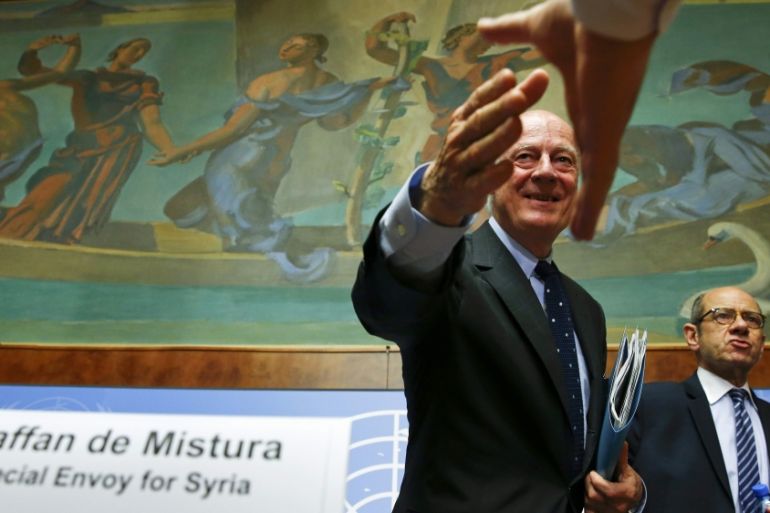More talks about talks as Syrians suffer
Over a year later, we’re back in the serene Swiss environs to try and find a peaceful solution to the Syrian conflict.

Last year’s “Geneva 2” Syrian peace talks were diplomacy’s equivalent of a football cup final. Record breaking numbers of journalists camped outside of the main venue with a sense that the sheer weight of international actors committed to finding a peaceful way out would break the bloody deadlock.
The Americans and the Russians appeared to be on the same page and with the experienced Lakhdar Brahimi at the centre of things, the formula seemed destined to deliver something.
Keep reading
list of 4 itemsUN’s Libya envoy resigns citing no hope for political progress
UN urges restraint as Iran and Israel trade barbs at Security Council
Iran claims ‘right to self-defence’ in Israel attack
Alas, the analysts who queried the unity of the opposition and the intentions of the Syrian regime were proved right as talks quickly collapsed with little in the way of progress made. Over a year later we’re back in the serene Swiss environs with another attempt at finding a peaceful solution to the most violent conflict of a generation.
|
|
The faint optimism held by some around Geneva 2 is absent from this year’s longer and more low key process led by the unassuming new peace envoy, Staffan de Mistura. Over a period of five to six weeks some 40 invited groups will talk about talking, avoiding direct contact with their opponents in favour of shuttle diplomacy.
Iran included
In 2014, the big news was the absence of the Iranians who had found themselves without an invitation. This time round, with realistic hope as to a deal on their nuclear programme with the Americans on the horizon, Iran will be part of the process.
ISIL, who’ve seized the agenda as well as large parts of Syrian territory over the past 12 months, has unsurprisingly not been invited into the civilised Swiss surroundings although their absence is simply another reminder of the lack of a coherent plan for what to do with them.
While it could have been predicted that Iran would be invited for the proceedings at some point, what is far harder to assess is what the Syrian regime is hoping to get from this latest attempt at making peace.
|
ISIL … has unsurprisingly not been invited into the civilised Swiss surroundings although their absence is simply another reminder of the lack of a coherent plan for what to do with them.
|
A new Amnesty report into the conflict has painted a picture of “war crimes on a daily basis”. The apparent increase in the use of chlorine gas as a weapon alongside the deadly medley of barrel bombs and other aerial horrors is a sign of a more desperate leadership in Damascus.
The prospect of external pressure is also on the rise with the US apparently willing to pursue more punitive measures at the United Nations in response to allegations of the use of chemical weapons. Meanwhile the Syrian economy is a mess and this week the regime, with an estimated $1bn left in reserves, pumped $200m into stabilising its currency.
Little common ground
Do these factors combine into a new atmosphere at the top of the Syrian regime into discussing opposition demands – previously a red line that brought down Geneva 2?
Potentially any process that eases the stranglehold on the economy and notions of additional sanctions would seem very attractive to Assad. However, with so little common ground and a grave lack of trust between the warring parties, de Mistura’s diplomatic back and forth is unlikely to convince opposition groups of the Syrian regime’s good intentions.
Meanwhile, opposition groups have been making gains without heavy backing from outside, their improved coordination a “realisation that they can’t rely on anyone but themselves” according to an investigation by the Daily Beast.
However this progress had “extremist” groups integral to it who won’t be present which begs the question as to whether the opposition’s Geneva representatives can speak genuinely on behalf of factions on the ground.
De Mistura is confident that he’s got the right people to Switzerland – if not yet in the same room – and he deserves the chance to test his theories in practice. The process is also protected by the minimal expectations and the absence of clear cut off dates.
One X-factor that could change the balance of things is the presence of other actors in the process. De Mistura explained that he has invited a “broad spectrum of youth, political and military actors, women, victims, civil society, diaspora, religious and community leaders and more”.
Broadening the process beyond those armed political actors whose failure so far has been almost absolute is a smart move as there is a clear need for fresh legitimate Syrian voices in this desperate search for common ground.
James Denselow is a writer on Middle East politics and security issues and a research associate at the Foreign Policy Centre.
The views expressed in this article are the author’s own and do not necessarily reflect Al Jazeera’s editorial policy.
